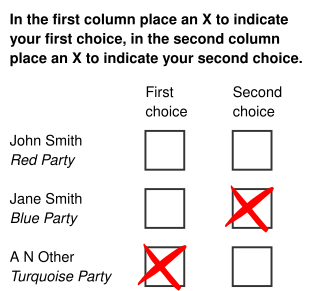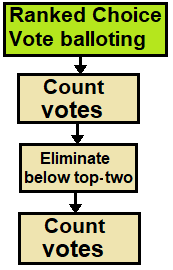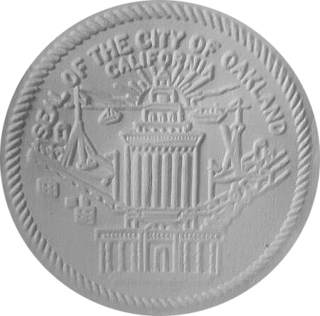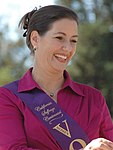
The two-round system (TRS), also known as runoff voting, second ballot, or ballotage, is a voting method used to elect a single candidate, where voters cast a single vote for their preferred candidate. It generally ensures a majoritarian result, not a simple-plurality result as under first past the post. Under the two-round election system, the election process usually proceeds to a second round only if in the first round no candidate received a simple majority of votes cast, or some other lower prescribed percentage. Under the two-round system, usually only the two candidates who received the most votes in the first round, or only those candidates who received above a prescribed proportion of the votes, are candidates in the second round. Other candidates are excluded from the second round.

The monotonicity criterion is a voting system criterion used to evaluate both single and multiple winner ranked voting systems. A ranked voting system is monotonic if it is neither possible to prevent the election of a candidate by ranking them higher on some of the ballots, nor possible to elect an otherwise unelected candidate by ranking them lower on some of the ballots. That is to say, in single winner elections no winner is harmed by up-ranking and no loser is helped by down-ranking. Douglas Woodall called the criterion mono-raise.

FairVote, formerly the Center for Voting and Democracy, is a 501(c)(3) organization that advocates electoral reform in the United States.

The supplementary vote (SV) is an electoral system used to elect a single winner, in which the voter ranks two of the candidates in order of preference. In an election, if no candidate receives an absolute majority of first-preference votes, then all but the two leading candidates are eliminated and there is a second count. In the second count, the votes of those who supported eliminated candidates are distributed among the two remaining candidates, so that one candidate achieves an absolute majority.
Instant-runoff voting (IRV) is a voting method used in single-seat elections with more than two candidates. Instead of voting only for a single candidate, voters in IRV elections can rank the candidates in order of preference. Ballots are initially counted for each elector's top choice, losing candidates are eliminated, and ballots for losing candidates are redistributed until one candidate is the top remaining choice of a majority of the voters. When the field is reduced to two, it has become an "instant runoff" that allows a comparison of the top two candidates head-to-head.

The contingent vote is an electoral system used to elect a single representative in which a candidate requires a majority of votes to win. A variation of instant-runoff voting (IRV), it is form of preferential voting. The voter ranks the candidates in order of preference, and when the votes are counted, the first preference votes only are counted. If no candidate has a majority of the votes cast, then all but the two leading candidates are eliminated and the votes received by the eliminated candidates are distributed among the two remaining candidates according to voters' preferences. This ensures that one candidate achieves a majority and is declared elected.

Ranked-choice voting (RCV) can refer to one of several ranked voting methods used in some cities and states in the United States. The term is not strictly defined, but most often refers to instant-runoff voting (IRV) or single transferable vote (STV).
Instant-runoff voting (IRV) or preferential voting is an electoral system that uses ranked voting. Its purpose is to elect the candidate in single-member districts with majority support even when there are more than two candidates. Instant-runoff voting most often accomplishes majority rule but does not guarantee it. It is a single-winner version of single transferable voting. Formerly the term "instant-runoff voting" was used for what many people now call contingent voting or supplementary vote.

The 2009 Burlington mayoral election was held in March 2009 for the city of Burlington, Vermont. A few years earlier, the city had switched to holding mayoral elections every three years, so this was the second mayoral election since the city's 2005 change to instant-runoff voting (IRV). In the 2009 election, incumbent Burlington mayor won reelection as a member of the Vermont Progressive Party.

Lai Jean Quan is an American politician who was the 49th mayor of Oakland, California from 2011 to 2015. She previously served as City Council member for Oakland's 4th District. Upon inauguration on January 3, 2011, she became Oakland's first female mayor. Quan ran an unsuccessful campaign for reelection in 2014, losing the mayoral race to Libby Schaaf, a member of the Oakland City Council.

The 2011 San Francisco mayoral election was held on Tuesday, November 8, 2011, to elect the mayor of San Francisco. The incumbent Ed Lee, appointed to fill the vacant mayoral seat, succeeded in his bid to become the first elected Asian-American mayor of a major American city.

Elizabeth Beckman Schaaf is an American politician who served as the 50th Mayor of Oakland, California from 2015 to 2023. A member of the Democratic Party, she previously served on the Oakland City Council.

The Oakland City Council is an elected governing body representing the City of Oakland, California.
A unified primary is an electoral system for narrowing the field of candidates for a single-winner election, similar to a nonpartisan blanket primary, but using approval voting for the first round, advancing the top-two candidates, allowing voters to confirm the majority-supported candidate in the general election.

Cat Brooks is an American activist, playwright, poet and theater artist. She was a mayoral candidate in Oakland's 2018 election.

The 2018 Oakland mayoral election was held on November 6, 2018 to elect the mayor of Oakland, California. Incumbent mayor Libby Schaaf was reelected. The election was held using instant-runoff voting, but Schaaf received a majority of votes in the first round, so no additional rounds were necessary.

The 2010 Oakland mayoral election was held on November 2, 2010 to elect the mayor of Oakland, California, electing Jean Quan to be their mayor. In early August 2010, incumbent mayor Ron Dellums announced that he would not be seeking reelection to a second term. In November 2010, Oakland also instant-runoff voting to elect its mayor, three city council races and four other local offices, with the elections for the mayor and Oakland council district four requiring multiple rounds of counting. Oakland used instant-runoff voting in the city's remaining elected offices in 2012. IRV was again used in 2014 and 2016, including in the 2014 mayoral election in which incumbent Jean Quan was defeated by Libby Schaaf.

Massachusetts Ranked-Choice Voting Initiative, also known as Question 2, was an initiative at the 2020 Massachusetts general election that would have changed primaries and elections in Massachusetts from plurality voting to ranked-choice voting (RCV) for all Massachusetts statewide offices, state legislative offices, federal congressional offices, and certain other offices beginning in 2022. RCV would not be extended to elections for president, county commissioner, or regional district school committee member. The initiative failed, with 54.8% of voters voting 'No' and 45.2% 'Yes'.

The 2022 Oakland mayoral election was held on November 8, 2022, to elect the mayor of Oakland, California. The previous incumbent mayor Libby Schaaf was term-limited. Sheng Thao won the election and was inaugurated as mayor in January 2023.
A top-four primary or top-four ranked-choice voting is an election method using a nonpartisan blanket primary where up to four candidates, those with the most votes, advance from a first round of voting, regardless of the political party. The round two (general) election, held some weeks later, uses instant-runoff voting to confirm a majority winner among the top set of candidates.



























